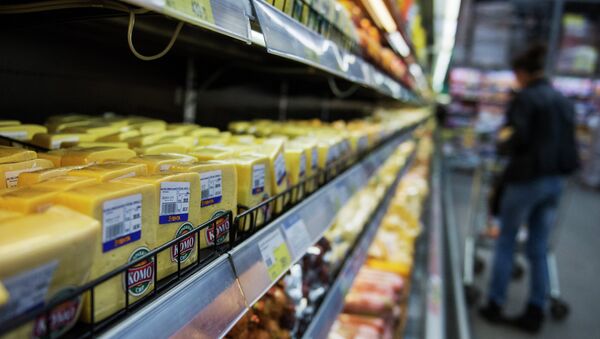MOSCOW, August 8 (RIA Novosti) — The Russian embargo on food imports from the EU will have not only economic but also political consequences.
Judging by the reactions of some European leaders, it can be speculated that Moscow managed to hit a vulnerable point of the European Union. Polish and Finnish officials have already expressed their intentions to seek financial compensation from the European Commission.
The problem is that although the European leaders have repeatedly mentioned the principle of European solidarity, there is no legal mechanism to compensate the countries suffering from Russian retaliatory measures. It is also safe to assume that finding additional funds in order to pay the compensations will be a difficult task, given the dire state of the European economy.
Certainly, those issues will not prevent political leaders from countries affected by the Russian embargo from demanding financial aid because for them it is the only viable political strategy.
According to the EU ambassador to Russia, the European Union may lose up to 12 billion euro ($16 billion) because of Russia’s ban on food imports. However, this estimate is unlikely to be accurate because it only takes into account the direct damage inflicted by the ban. Farmers who are unable to sell their crops to Russia, won't be able to pay their bank credit, their suppliers and employees. Affected countries, trade groups and agricultural unions will seek compensations from the European Union, rightly blaming Brussels for their woes.
Does the European Commission have a contingency plan for such a scenario? The obvious answer is “no”, because the bureaucrats never imagined that international sanctions is a game that can be played by more than one player. By banning European food imports, Vladimir Putin managed to shift the conflict between Moscow and Brussels from the realm of international politics into the realm of internal European politics.
The ruined farmers, the banks, the farmers' suppliers and employees will demand a swift end to the standoff between the European Union and Russia. Despite all the rhetoric, it is unlikely that Europeans are ready to sacrifice their profits in order to help the US advance its geopolitical ambitions in Ukraine.
Even some die-hard Russophobes from the European financial press are beginning to understand that European sanctions will surely fail to help Ukraine and are therefore pointless. The Economist Intelligence Unit summed it up in a tweet:
If #Russia's sanctions flatten #EU growth, recession in #Ukraine could be even worse than forecast http://t.co/8GtxksQMvZ
— The EIU (@TheEIU) August 6, 2014
Hopefully, it won't take long for the decision makers in Brussels to reach the same conclusion, ditch the sanctions, tell Washington to stop meddling in Europe and finally create a meaningful continental security framework involving Russia.

